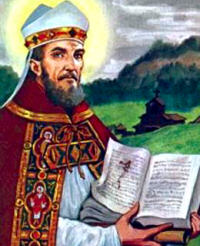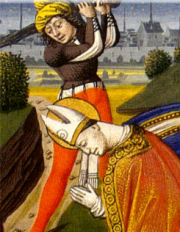18. Then come to him the Sadducees, which say there is no resurrection; and they asked him, saying,
19. Master, Moses wrote to us, If a man's brother die, and leave his wife behind him, and leave no children, that his brother should take his wife, and raise up seed to his brother.
20. Now there were seven brethren: and the first took a wife, and dying left no seed.
21. And the second took her, and died, neither left he any seed: and the third likewise.
22. And the seven had her, and left no seed: last of all the woman died also.
23. In the resurrection therefore, when they shall rise, whose wife shall she be of them? for the seven had her to wife.
24. And Jesus answering, said to them, Do you not therefore err, because you know not the Scriptures, neither the power of God?
25. For when they shall rise from the dead, they neither marry, nor are given in marriage; but are as the angels which are in heaven.
26. And as touching the dead, that they rise: have you not read in the book of Moses, how in the bush God spoke to him, saying, I am the God of Abraham, and the God of Isaac, and the God of Jacob?
27. He is not the God of the dead, but the God of the living: you therefore do greatly err.
GLOSS. After that our Lord has prudently escaped the crafty temptation of the Pharisees, it is shows how He also confounds the Sadducees, who tempt Him; wherefore it is Said: Then come to him the Sadducees, which say there is no resurrection.
THEOPHYL. A certain heretical sect of the Jews called Sadducees denied the resurrection, and said that there was neither angel nor spirit. These then coming to Jesus, craftily proposed to Him a certain tale, in order to show that no resurrection should take place, or had taken place; and therefore there is added, And they asked him, saying, Master.
And in this tale they lay down that seven men had married one woman, in order to make men draw back from belief in the resurrection.
BEDE; And fitly do they frame such a fable in order to prove the madness of those who assert the resurrection of the body. Such a thing however might really have happened at some time or other among them.
PSEUDO-JEROME; But in a mystical sense: what can this woman, leaving no seed of seven brothers, and last of all dying, mean except the Jewish synagogue, deserted by the seven-fold Spirit, which filled those seven patriarchs, who did not leave to her the seed of Abraham, that is, Jesus Christ? For although a Son was born to them, nevertheless He was given to us Gentiles.
This woman was dead to Christ, nor shall she be joined in the resurrection to any patriarch of the seven; for by the number seven is meant the whole company of the faithful. Thus it is said contrariwise by Isaiah, Seven women shall take hold of one man; that is, the seven Churches, which the Lord loves, reproves, and chastises, adore Him with one faith.
Wherefore it goes on: And Jesus answering, said to them, Do you not therefore err, not knowing the Scripture, neither the power of God!
THEOPHYL. As if He had said, you understand not what sort of a resurrection the Scriptures announce; for you believe that there will be a restoration of our bodies, such as they are now, but it shall not be so. Thus then you know not the Scriptures; neither again do you know the power of God; for you consider it as a difficult thing, saying, How can the limbs, which have been scattered, be united together and joined to the soul? But this in respect of the Divine power is as nothing.
There follows: For when they shall rise from the dead, they neither marry, nor are given in marriage; but are as the angels which are in heaven; as if He had said, There will be a certain heavenly and angelic restoration to life, when there shall be no more decay, and we shall remain unchanged; and for this reason marriage shall cease. For marriage now exists on account of our decay, that we may be carried on by succession of our race, and not fail; but then we shall be as the Angels, which need no succession by marriage, and never come to an end.
BEDE; We must here consider that the Latin custom does not answer to the Greek idiom. For properly different words are used for the marriage of men, and that of women; but here we may simply understand that, marry is meant of men, and given in marriage of women.
PSEUDO-JEROME; Thus then they do not understand the Scripture, in that in the resurrection, men shall be as the Angels of God, that is, no man there dies, no one is born, no infant is there, no old man.
THEOPHYL. In another way also they are deceived, not understanding the Scriptures; for if they had understood them, they should also have understood how by the Scriptures the resurrection of the dead may be proved; wherefore He adds, And as touching the dead, that they rise, have you not read in the took of Moses, how in the bush God spoke to him, saying, I am the God of Abraham, and the God of Isaac, and the God of Jacob?
PSEUDO-JEROME; But I say, in the bush, in which is an image of you; for in it the fire was kindled, but it did not consume its thorns; so my words set you on fire, but do not burn off your thorns, which have grown under the curse.
THEOPHYL. But I say, I am the God of Abraham, the God of Isaac, and the God of Jacob. As if He had said, The God of the living, wherefore He adds, He is not the God of the dead, but of the living; for He did not say, I have been, but I am, as if they had been present. But some one perhaps will say, that God spoke this only of the soul of Abraham, not of His body; to which I answer, that Abraham implies both, that is, soul and body, so that He also is the God of the body, and the body lives with God, that is, in God's ordinance.
BEDE; Or else; because after proving that the soul remained after death, (for God could not be God of those who did not exist at all,) the resurrection of the body also might be inferred as a consequence, since it had done good and evil with the soul.
PSEUDO-JEROME; But when He says, The God of Abraham, the God of Isaac, and the God of Jacob; by naming God thrice, He implied the Trinity. But when He says, He is not the God of the dead, by naming again the One God, he implies One Substance. But they live who make good the portion, which they had chosen; and they are dead, who have lost what they had made good. You therefore do greatly err.
GLOSS. That is, because they contradicted the Scriptures, and derogated from the power of God.
Catena Aurea Mark 12


 In 724 he turned his attention to the Hessian people, among whom he continued his missionary activity with renewed zeal. On an eminence near the village of Geismar on the Eder, he felled a giant oak that the people honored as the national sanctuary of the god Thor. Boniface used the wood to build a chapel in honor of St. Peter. This courageous act assured the eventual triumph of the Gospel in Germany.
In 724 he turned his attention to the Hessian people, among whom he continued his missionary activity with renewed zeal. On an eminence near the village of Geismar on the Eder, he felled a giant oak that the people honored as the national sanctuary of the god Thor. Boniface used the wood to build a chapel in honor of St. Peter. This courageous act assured the eventual triumph of the Gospel in Germany. 



